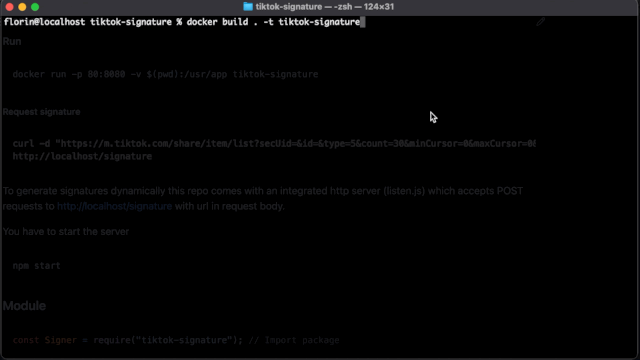Installation
npm i tiktok-signatureUsage
Generating signatures on high performance level
Build
docker build . -t tiktok-signatureRun
docker run -p 80:8080 -v $(pwd):/usr/app tiktok-signatureExample
Request signature
curl -X POST \
-H "Content-type: application/json" \
-d 'https://m.tiktok.com/share/item/list?secUid=&id=&type=5&count=30&minCursor=0&maxCursor=0&shareUid=' \
http://localhost/signature
To generate signatures dynamically this repo comes with an integrated http server (listen.js) which accepts POST requests to http://localhost/signature with url in request body.
You have to start the server
npm startModule
const Signer = require("tiktok-signature"); // Import package
const signer = new Signer(); // Create new signer
await signer.init(); // Create page with. Returns promise
const signature = await signer.sign("tiktok url"); // Get sign for your url. Returns promise
const navigator = await signer.navigator(); // Retrieve navigator data used when signature was generated
console.log(signature);
console.log(navigator);
await signer.close(); // Close browser. Returns promiseYou can pass your desired User-Agent on class creation.
new Signer("Mozilla"); // Set User-Agent to MozillaCLI
Install dependencies
npm i playwright-chromiumNow you can generate the token using
node browser.js "https://m.tiktok.com/api/post/item_list/?aid=1988&count=30&secUid=MS4wLjABAAAAOUoQXeHglWcq4ca3MwlckxqAe-RIKQ1zlH9NkQkbLAT_h1_6SDc4zyPdAcVdTWZF&cursor=0"The response token should look like this
{
"status": "ok",
"data": {
"signature": "_02B4Z6wo00f01DBbvBwAAIBCcuSZt1Pua8AwS7iAAGyZ6e",
"verify_fp": "verify_knvz9j2k_miXwiqOy_msam_42g2_BYoa_e4EAbuQnDwqI",
"signed_url": "https://m.tiktok.com/api/post/item_list/?aid=1988&count=30&secUid=MS4wLjABAAAAOUoQXeHglWcq4ca3MwlckxqAe-RIKQ1zlH9NkQkbLAT_h1_6SDc4zyPdAcVdTWZF&cursor=0&verifyFp=verify_knvz9j2k_miXwiqOy_msam_42g2_BYoa_e4EAbuQnDwqI&_signature=_02B4Z6wo00f01DBbvBwAAIBCcuSZt1Pua8AwS7iAAGyZ6e",
"navigator": {
"width": 884,
"height": 1244,
"deviceScaleFactor": 3,
"user_agent": "Mozilla/5.0 (Windows NT 10.0; Win64; x64) AppleWebKit/537.36 (Windows NT 10.0; Win64; x64) Chrome/90.0.4430.85 Safari/537.36",
"browser_language": "en-US",
"browser_platform": "MacIntel",
"browser_name": "Mozilla",
"browser_version": "5.0 (Windows NT 10.0; Win64; x64) AppleWebKit/537.36 (Windows NT 10.0; Win64; x64) Chrome/90.0.4430.85 Safari/537.36"
}
}
}Testing
You can test it using trending.py file included in this repo.
pip install Naked
python examples/trending.pyNOTE
It's very important that the userAgent be the same when generate and when request for response.
Keeping a process too much time opened can increase memory usage, to avoid this uncomment the following lines in listen.js.
// setTimeout(function () {
// server.close(() => {
// console.log("Server shutdown completed.");
// process.exit(1);
// });
// }, 1 * 60 * 60 * 1000);Contributing
Bug reports and pull requests are welcome on GitHub at https://github.com/carcabot/tiktok-signature.
- Fork it (https://github.com/carcabot/tiktok-signature/fork)
- Create your feature branch (
git checkout -b my-new-feature) - Commit your changes (
git commit -am 'Add some new feature') - Push to the branch (
git push origin my-new-feature) - Create a new Pull Request
License
The lib is available as open source under the terms of the MIT License.



